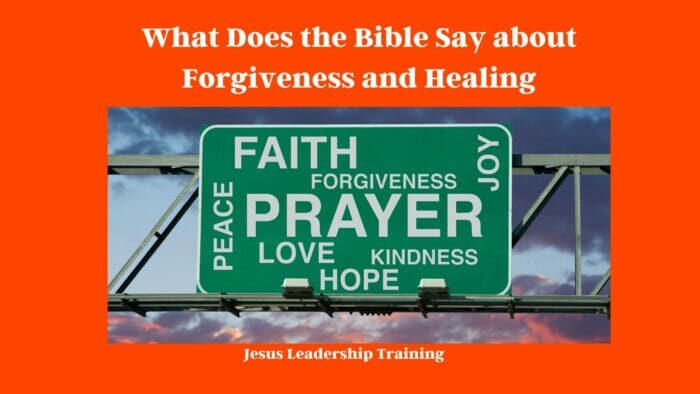What Does the Bible Say about Forgiveness and Healing – The Bible, as a spiritual guide, provides valuable insights on various aspects of human life. Among the significant topics it addresses, forgiveness and healing hold tremendous significance. In this article, we will explore the teachings of the Bible regarding forgiveness and healing and understand the interconnectedness of these concepts.
Table of Contents
The Importance of Forgiveness -What Does the Bible Say about Forgiveness and Healing
Forgiveness, both divine and human, plays a pivotal role in the Bible. It is a powerful act that brings freedom, restoration, and reconciliation. The teachings of Jesus Christ emphasize forgiveness as a central theme in Christian faith.

Table Showing How Forgivess affects Healing
| Aspect of Healing | Description of How Forgiveness Contributes |
|---|---|
| 1. Emotional Healing | Forgiveness allows individuals to let go of burdensome negative emotions such as resentment, bitterness, and anger. It can reduce feelings of depression and anxiety, facilitating a more peaceful state of mind. |
| 2. Physical Healing | Holding onto anger and resentment can cause physical stress, resulting in conditions like high blood pressure, heart disease, and a weakened immune system. Forgiveness can help to alleviate these stress responses, promoting physical wellbeing. |
| 3. Spiritual Healing | Forgiving others aligns with the teachings of various religious and spiritual traditions, including Christianity. When individuals forgive, they emulate the divine forgiveness offered by God, which can lead to a deeper spiritual connection and healing. |
| 4. Psychological Healing | Forgiveness can lead to lower levels of stress and improve psychological wellbeing. It can increase positive feelings such as hope and self-confidence, aiding in the overall psychological healing process. |
| 5. Social Healing | Forgiveness can mend strained relationships, promoting reconciliation and mutual understanding. It encourages empathy and compassion, fostering healthier social interactions. |
| 6. Mental Health | Studies have found that practicing forgiveness can decrease symptoms related to mental health disorders such as major depressive disorder and post-traumatic stress disorder (PTSD). |
| 7. Healing from Trauma | Forgiveness is often a crucial part of trauma recovery. While it doesn’t justify or excuse harmful actions, it allows victims to release the power the trauma holds over them. |

Regenerate response
Biblical Teachings on Forgiveness
In Matthew 6:14-15, Jesus teaches, “For if you forgive others their trespasses, your heavenly Father will also forgive you, but if you do not forgive others their trespasses, neither will your Father forgive your trespasses.” This verse highlights the reciprocal nature of forgiveness, encouraging believers to extend forgiveness to others just as God forgives them.
| Benefit | Description |
|---|---|
| 1. Emotional Healing | Forgiveness leads to the healing of emotional pain, helping you to let go of the hurt and resentment that burdens your heart. |
| 2. Health Improvement | Holding on to negative emotions can cause physical stress, leading to health issues. Forgiveness helps reduce this stress, thereby improving overall health. |
| 3. Peace of Mind | Forgiveness frees you from the turmoil of dwelling on the past, providing peace of mind and allowing you to focus on the present. |
| 4. Relationship Restoration | Forgiveness provides a chance to mend and restore damaged relationships, fostering understanding and reconciliation. |
| 5. Personal Growth | The act of forgiving can lead to personal growth and maturity, as you learn to manage your emotions and extend grace to others. |
| 6. Spiritual Wellbeing | As a core tenet of many religious teachings, including Christianity, forgiveness can enhance your spiritual wellbeing and relationship with God. |
| 7. Freedom | Forgiving someone releases the chains of bitterness and anger, bringing a sense of freedom and relief. |
| 8. Improved Mental Health | Forgiveness is associated with lower levels of depression, anxiety, and symptoms of post-traumatic stress disorder (PTSD). |
| 9. Increased Compassion | Forgiving others cultivates a deeper level of compassion and understanding towards others and their flaws. |
| 10. Strengthens Community | When forgiveness is extended in communities, it can help build stronger, more resilient groups, contributing to societal harmony. |

Teachings of Jesus on Forgiveness
| Primary Teaching | Description |
|---|---|
| 1. Forgiveness is Mandatory | In Matthew 6:14-15, Jesus teaches that if we want God to forgive us, we must also forgive others. |
| 2. Unlimited Forgiveness | Jesus taught in Matthew 18:21-22 that forgiveness should be given without limit, symbolically “seventy times seven” times. |
| 3. Parable of the Unmerciful Servant | In Matthew 18:23-35, Jesus emphasizes the importance of forgiving debts (symbolic of wrongs done to us), just as God forgives our debts against Him. |
| 4. Forgiveness from the Cross | Even while being crucified, Jesus forgave those who put him to death (Luke 23:34), setting the ultimate example of forgiveness. |
| 5. Forgive and You Will be Forgiven | In Luke 6:37, Jesus says, “Forgive, and you will be forgiven,” underscoring the reciprocal nature of forgiveness. |
| 6. The Prodigal Son | In this parable (Luke 15:11-32), Jesus illustrates the joy and forgiveness that God extends towards us when we repent and return to Him. |
| 7. The Parable of the Two Debtors | In Luke 7:36-50, Jesus explains that those who have been forgiven much, love much, indicating that experiencing forgiveness can lead to deep love and gratitude. |
| 8. Sin, Repentance, and Forgiveness | In Luke 17:3-4, Jesus states that if a person sins against you and repents, you must forgive them, emphasizing the importance of repentance in the process of forgiveness. |
| 9. The Lord’s Prayer | In Matthew 6:12, in teaching how to pray, Jesus included the need to ask God to forgive our debts as we also have forgiven our debtors. |
| 10. Forgiveness Leads to Healing | In multiple instances (such as Matthew 9:2), Jesus equates the forgiveness of sins with the healing of physical ailments, highlighting the powerful restorative aspect of forgiveness. |

Psychological and Emotional Benefits
Apart from its spiritual implications, forgiveness offers numerous psychological and emotional benefits. Studies have shown that forgiving others reduces stress, improves mental health, and promotes overall well-being. It releases the burden of resentment and allows individuals to experience inner peace.
| Benefit | Description |
|---|---|
| 1. Emotional Healing | Forgiveness leads to the healing of emotional pain, helping you to let go of the hurt and resentment that burdens your heart. |
| 2. Health Improvement | Holding on to negative emotions can cause physical stress, leading to health issues. Forgiveness helps reduce this stress, thereby improving overall health. |
| 3. Peace of Mind | Forgiveness frees you from the turmoil of dwelling on the past, providing peace of mind and allowing you to focus on the present. |
| 4. Relationship Restoration | Forgiveness provides a chance to mend and restore damaged relationships, fostering understanding and reconciliation. |
| 5. Personal Growth | The act of forgiving can lead to personal growth and maturity, as you learn to manage your emotions and extend grace to others. |
| 6. Spiritual Wellbeing | As a core tenet of many religious teachings, including Christianity, forgiveness can enhance your spiritual wellbeing and relationship with God. |
| 7. Freedom | Forgiving someone releases the chains of bitterness and anger, bringing a sense of freedom and relief. |
| 8. Improved Mental Health | Forgiveness is associated with lower levels of depression, anxiety, and symptoms of post-traumatic stress disorder (PTSD). |
| 9. Increased Compassion | Forgiving others cultivates a deeper level of compassion and understanding towards others and their flaws. |
| 10. Strengthens Community | When forgiveness is extended in communities, it can help build stronger, more resilient groups, contributing to societal harmony. |

Understanding Healing and Restoration
Healing, in the biblical context, encompasses physical, emotional, and spiritual restoration. It involves finding wholeness and harmony through God’s grace and the power of forgiveness.
Biblical Perspective on Healing
The Bible portrays God as the ultimate healer. In Exodus 15:26, God declares Himself as the “Lord who heals you.” It reveals His compassionate nature and the desire to restore His people.
Table of Biblical examples of Forgiveness
| Biblical Character | Description of Forgiveness Act |
|---|---|
| 1. Joseph | Despite being sold into slavery by his brothers, Joseph forgave them. When they came to him for help during a famine, he provided for them and their families, choosing to see God’s hand in his sufferings instead of harboring resentment (Genesis 50:15-21). |
| 2. King David | King David forgave Shimei, who had cursed him during Absalom’s rebellion. Despite his soldiers’ advice to the contrary, David spared Shimei’s life, showing mercy and forgiveness (2 Samuel 16:5-14; 19:16-23). |
| 3. Jesus Christ | Jesus asked His Father to forgive those who crucified Him, stating, “Father, forgive them, for they do not know what they are doing” (Luke 23:34). This is the ultimate example of forgiveness, given at the point of extreme suffering and death. |
| 4. Stephen | While being stoned to death for his faith, Stephen echoed Jesus’ sentiment by asking God not to hold his killers accountable for their actions, demonstrating deep forgiveness even in his final moments (Acts 7:59-60). |
| 5. Apostle Paul | Despite the harsh treatment he received from various people, Paul chose forgiveness and continued his mission to spread the Gospel. He forgave John Mark for abandoning him and Barnabas during their missionary journey, leading to John Mark’s restoration in ministry (2 Timothy 4:11). |
| 6. The Prodigal Son’s Father | In the parable of the Prodigal Son, the father, who represents God, exemplifies ultimate forgiveness. He welcomes his son back with open arms and rejoices for his return, even after the son had wasted his inheritance and lived a sinful life (Luke 15:11-32). |
| 7. God | Throughout the Bible, God demonstrates His willingness to forgive humanity’s sins. One prominent example is when God forgave the people of Nineveh when they repented after Jonah’s prophecy (Jonah 3:10). |
Healing through Forgiveness
Forgiveness and healing are closely intertwined. When we forgive others and ourselves, we open the door to divine healing. Psalm 147:3 states, “He heals the brokenhearted and binds up their wounds.” This verse assures us that God’s healing power is available to those who choose forgiveness.
Table explaining how to Give forgiveness
| Step | Description |
|---|---|
| 1. Acknowledge the Hurt | Recognize and admit the pain you feel. Be honest with yourself about the impact of the offence. |
| 2. Empathize with the Offender | Try to understand the offender’s perspective. What led them to act in the way they did? This is not to excuse their behavior, but to understand it. |
| 3. Express Your Hurt | If possible and appropriate, tell the person who hurt you how you feel. This can be a significant step in the healing process. |
| 4. Choose to Forgive | Forgiveness is a conscious decision. Decide that you will not hold the offence against them anymore. |
| 5. Let Go of the Desire for Revenge | This is often the hardest part of forgiveness, but it’s crucial. Holding on to a desire for revenge only prolongs the pain. |
| 6. Practice Mindfulness | This can help you to focus on the present rather than dwelling on past hurts. |
| 7. Seek Professional Help if Needed | If the hurt is too great to manage on your own, consider seeking help from a pastor, counselor, or other professional. |
| 8. Understand it’s a Process | Forgiveness may not come all at once. Be patient with yourself if it takes time to fully forgive. |
| 9. Pray for Help | If you’re a believer, pray for God’s help in forgiving. The Bible tells us that with God, all things are possible (Matthew 19:26). |
| 10. Rebuild Trust, if Appropriate | If the person who hurt you is repentant and wants to rebuild the relationship, and if it’s safe to do so, you can begin the process of building trust again. |
Steps to Achieve Forgiveness and Healing
While forgiveness and healing may seem challenging, certain steps can aid the process.
- Acknowledge that you have sinned and ask for forgiveness: In order to receive forgiveness, it is important to first acknowledge that you have sinned and then ask for forgiveness. The Bible instructs us to “confess our sins to one another and pray for one another that we may be healed” (James 5:16).
- Repent and turn away from sin: Repentance is an essential part of the process of forgiveness. It involves turning away from sin and making a commitment to live a life that is pleasing to God. The Bible says, “Let the wicked forsake his way and the unrighteous man his thoughts; let him return to the Lord, and He will have mercy on him” (Isaiah 55:7).
- Ask God for forgiveness: The Bible tells us that we should always go directly to God and ask for His forgiveness. Jesus says, “If you forgive anyone his sins, they are forgiven; if you do not forgive them, they are not forgiven” (John 20:23).
- Accept God’s forgiveness: Once you have asked God for forgiveness, it is important to accept His forgiveness. The Bible says, “Be kind and compassionate to one another, forgiving each other, just as in Christ God forgave you” (Ephesians 4:32).
- Seek healing: Once you have asked for and accepted forgiveness from God, it is important to seek healing. This can be done through prayer and Bible study. The Bible says, “He heals the brokenhearted and binds up their wounds” (Psalm 147:3).
- Forgive yourself: After seeking forgiveness and healing from God, it is important to forgive yourself. The Bible says, “Blessed is the one whose transgression is forgiven, whose sin is covered” (Psalm 32:1).
- Forgive others: Finally, it is important to forgive others who have wronged you. The Bible says, “Bear with each other and forgive one another if any of you has a grievance against someone. Forgive as the Lord forgave you” (Colossians 3:13).
Acknowledge the Pain and Hurt
Before forgiveness can take place, it is essential to acknowledge the pain and hurt caused by the offense. Recognizing the emotions associated with the wrongdoing allows individuals to move towards healing.
Choose to Forgive
Forgiveness is a conscious choice. It involves letting go of bitterness, resentment, and the desire for revenge. By choosing forgiveness, individuals liberate themselves from emotional bondage.
Etymology of the Biblical Word Forgive
The word “forgive” is an important part of many religious and spiritual traditions. It’s a concept with roots that date back centuries, and one that has been expressed in a variety of languages throughout history. In this blog, we’ll explore the etymology of the biblical word “forgive” and how its meaning has evolved over time.
Origin
The word “forgive” is derived from the Latin word “perdonare,” which means “to give freely.” This term is itself derived from two other Latin words: “per” meaning “through” and “donare” meaning “to give.” When combined, these two words create a sense of giving something freely without expecting anything in return.
Hebrew
The Hebrew word for forgive is “salachti,” which literally translates to “I have pardoned.” This phrase is used in the Bible to describe God’s willingness to forgive the sins of His people. The idea of forgiveness in this context is seen as a divine act of mercy, and it is an important part of Jewish theology.
Greek
The Greek word for forgive is “aphiemi” which means “to send away.” This term is used to describe the act of releasing someone from debt or obligation. It is also used to express the idea of forgiving someone for their sins.
Aramaic
The Aramaic word for forgive is “scharach,” which literally translates to “I have released.” This term is used to express the act of liberating someone from wrongdoing or debt. It is also used to express the idea of pardoning someone for their sins.
The word “forgive” has a rich history and has been used in a variety of languages and religious contexts. Its origin is rooted in the Latin word “perdonare,” which means “to give freely,” and it has been used in the Hebrew, Greek, and Aramaic languages to express the concept of pardoning someone for their sins. Understanding the etymology of the biblical word “forgive” is an important part of understanding its spiritual and religious connotations.
Seek God’s Guidance and Strength (God)
Through prayer and seeking God’s guidance, individuals can find the strength to forgive. Turning to God in times of struggle allows His divine wisdom and grace to lead the way.
Letting Go and Moving Forward
Once forgiveness is extended, it is vital to release the past and focus on the future. This step enables individuals to move forward with renewed hope, leaving behind the burdens of the past.
Etymology of the Biblical Word Heal
The word ‘heal’ has a long and storied history that goes back to the Bible and beyond. From Hebrew to Greek to Aramaic, the etymology of the word ‘heal’ can tell us a lot about how it has evolved over the centuries. In this blog post, we’ll take a look at the origin of the word ‘heal’ and the different languages it has been used in.
Origin
The word ‘heal’ first appears in the Bible, specifically in the Old Testament. It is derived from the Hebrew word ‘rapha’, which is used to describe healing. This root word has been used in various languages over the centuries, including Greek and Aramaic. In the Bible, the word ‘heal’ is used to describe the healing of physical, mental, and spiritual ailments.
Hebrew
The Hebrew word ‘rapha’ is the root of the word ‘heal’. It is used to describe the healing of physical, mental, and spiritual ailments. The word ‘rapha’ appears throughout the Old Testament and is used to describe the healing of everything from leprosy to mental illness. The word ‘rapha’ is derived from the verb ‘raphah’, which means ‘to heal’ or ‘to cure’.
Greek
The Greek word for ‘heal’ is ‘iaomai’, which is derived from the verb ‘iaomai’, which means ‘to heal’ or ‘to cure’. This word is used to describe the healing of physical, mental, and spiritual ailments. In the New Testament, the word ‘iaomai’ is used to describe the healing of everything from leprosy to mental illness.
Aramaic
The Aramaic word for ‘heal’ is ‘marpe’, which is derived from the verb ‘marpes’, which means ‘to heal’ or ‘to cure’. This word is used to describe the healing of physical, mental, and spiritual ailments. The word ‘marpe’ appears throughout the Old Testament and is used to describe the healing of everything from leprosy to mental illness.
The word ‘heal’ has a long and storied history that goes back to the Bible and beyond. From Hebrew to Greek to Aramaic, the etymology of the word ‘heal’ can tell us a lot about how it has evolved over the centuries. The root of the word ‘heal’ is the Hebrew word ‘rapha’, which is derived from the verb ‘raphah’, meaning ‘to heal’ or ‘to cure’. The word ‘heal’ also appears in Greek (‘iaomai’) and Aramaic (‘marpe’), and is used to describe the healing of physical, mental, and spiritual ailments.
Overcoming Challenges on the Path to Healing
While forgiveness paves the way for healing, certain challenges may arise.
Dealing with Anger and Resentment
Overcoming anger and resentment can be a complex process. It requires self-reflection, seeking support from loved ones, and actively working towards inner transformation.
Rebuilding Trust
Forgiveness does not always mean immediate restoration of trust. Rebuilding trust takes time, transparency, and consistent actions that demonstrate genuine change.
Table explaining how to Give forgiveness (Bible Verses)
| Step | Description |
|---|---|
| 1. Confession | The first step is an honest confession of the wrongdoing. The person who broke the trust must fully acknowledge their mistake (1 John 1:9). |
| 2. Genuine Repentance | Repentance means turning away from sin and towards God. This should involve a sincere regret and a commitment not to repeat the transgression (2 Corinthians 7:9-10). |
| 3. Seeking Forgiveness | Once the person has genuinely repented, they should seek forgiveness from the person they wronged and from God (Matthew 5:23-24). |
| 4. Making Amends | If possible, the person should try to make amends for the wrong they did. This could involve returning stolen property or apologizing to a person they slandered (Luke 19:8). |
| 5. Demonstrating Change Over Time | Trust is not restored overnight. The person needs to demonstrate through their actions over time that they have truly changed (Matthew 3:8). |
| 6. Patience | The person whose trust was broken has the right to take their time in healing and deciding whether or not they want to offer another chance (Ecclesiastes 7:8). |
| 7. Rebuilding Trust | If both parties are willing, they can begin the process of slowly rebuilding trust. This is done by maintaining consistency, proving reliability, and upholding promises (Proverbs 25:19). |
| 8. Praying Together | Inviting God into the process can provide the strength and wisdom needed to restore trust (Philippians 4:6-7). |
| 9. Seeking Guidance | Guidance from spiritual leaders or mentors can provide valuable perspective and advice (Proverbs 11:14). |
| 10. Remembering God’s Love | Both parties should remember that they are loved by God, who is able to heal and restore even the most broken relationships (1 Peter 4:8). |
The Power of God’s Grace in Healing (Forgiving)
Throughout the Bible, we witness countless examples of God’s grace bringing healing and restoration. His love and mercy are available to all who seek forgiveness and yearn for healing.
Other Important Thoughts
- night prayers
- strength prayers
- trespasses matthew
- sins read
- peace prayers
- healing prayers
- protection prayers
Final Thoughts – What Does the Bible Say about Forgiveness and Healing (Forgiveness in Bible)
The Bible offers profound wisdom on forgiveness and healing. By embracing forgiveness, individuals can experience emotional liberation and pave the way for divine healing. Through God’s grace, the path to healing becomes a transformative journey that brings restoration and renewal.
FAQs
Q1: Is forgiveness always easy? Forgiveness can be challenging, especially when the hurt is deep. However, with willingness, self-reflection, and God’s help, forgiveness becomes attainable.
Q2: Can forgiveness be granted without reconciliation? Yes, forgiveness is independent of reconciliation. While forgiveness is a personal choice, reconciliation requires the willingness of both parties to restore the relationship.
Q3: What if someone keeps repeating the same offense? Repeated offenses test the limits of forgiveness. In such cases, setting healthy boundaries and seeking professional guidance may be necessary.
Q4: Can forgiveness occur without apologizing? Yes, forgiveness can take place even without an apology. It is a personal decision to let go of resentment and seek inner peace.
Q5: How can forgiveness benefit the forgiver? Forgiveness offers psychological and emotional benefits such as reduced stress, improved mental health, and enhanced overall well-being. It allows the forgiver to find inner peace and move forward.



